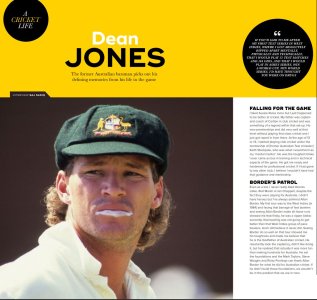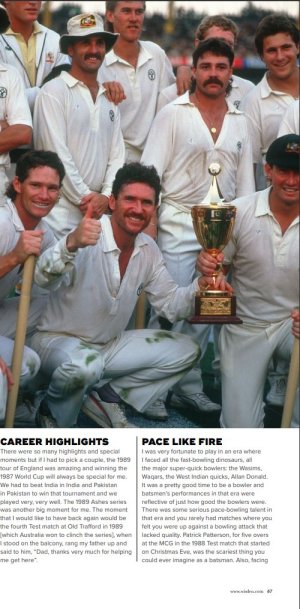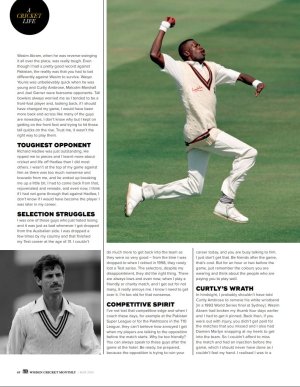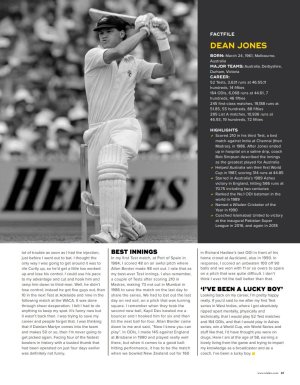Falling for the game
I just happened to be better at cricket, but I liked Aussie Rules better. My father was captain and coach for Carlton in club cricket and to play for Victoria, you had to play District cricket and my father was something of a legend within that set-up. He won premierships and did very well at that level without playing First-class cricket and I sort of just got roped in from there. At the age of 13 or 14, I started playing club cricket under the mentorship of Keith Stackpole who was what I would term as my ‘mental mentor’ and who was the toughest bloke I ever came across in training and in technical aspects of the game. He got me ready and hardened for professional cricket and if I had gone to any other club, I believe I would not have had that guidance and mentorship.
Border's Patrol
Even as a kid, I never really liked Dennis Lillee, Rod Marsh or Ian Chappell, despite that they were playing for Australia. I never really had it in my mind that I wanted to play for Australia. I was picked for Victoria and in my first game, Lillee was in the opposition line-up for Western Australia! I also played for Victoria against a touring England team and once I had that experience under my belt, I thought I don’t mind this, I didn’t know whether I was good enough but I quite enjoyed playing against the Gattings, Gowers and Bothams and all those guys and thought that was a bit of fun. However, I have always admired Allan Border, although I didn’t have heroes even when I first started playing for Australia. My first tour was to the West Indies and facing that barrage of fast-bowlers and seeing Allan Border make 521 runs showed me that firstly, he was a ripper bloke; secondly, that bowling was not going to get better than that West Indies group of pace-bowlers, and I still believe it never did. Seeing Border do so well on that tour showed me his toughness and made me believe that he is the Godfather of Australian cricket. He reluctantly took the captaincy, didn’t like doing it, but he realised that actually, it was more fun than making hundreds for Australia. He set the foundations for Australia from then on and the Mark Taylors, Steve Waughs and Ricky Pontings can thank Allan Border for what he did for Australian cricket. If he didn’t build the foundations, then we wouldn’t be in the position that we are in now.
Career Highlights
There were so many highlights and special moments. But if I had to pick a couple, the 1989 tour of England was an amazing tour and winning the 1987 World Cup was incredible. Those guys were an amazing bunch of team-mates. Batting alongside David Boon, playing in the same team as Allan Border was something special, playing alongside Steve Waugh, being there for Shane Warne’s first wicket, being in the same team as Glenn McGrath, and being a part of Matthew Hayden’s development, it was a lot of fun, to be honest.
Pace like fire
I’ve been very fortunate to play in an era where I played against and faced all the fast-bowling dinosaurs, all the major super-quick bowlers, the Wasims, Waqars, the West Indian quicks, Allan Donald, Kapil Dev and Richard Hadlee. Back then, it was a pretty good time to be a bowler and batsmen’s performances in that era were reflective of just how good bowlers were at that time. There was some serious pace-bowling talent in that era and you rarely had matches where you felt you were up against a bowling attack that lacked quality. Patrick Patterson, for 5 overs in 1988 at the MCG in the Test match that started on Christmas Eve, was the scariest thing you could ever imagine as a batsman. Also, facing Wasim Akram, when he was reverse-swinging it all over the place was really tough. Even though I had a pretty good record against Pakistan, but the reality was that you had to bat differently to Wasim to survive. Waqar Younis was unbelievably quick when he was young and Curtly Ambrose, Malcolm Marshall and Joel Garner were fearsome opponents. Tall bowlers always worried me as I tended to be a front-foot player and looking back, if I should have changed my game, it should have been more back and across like many of the guys do nowadays. I don’t know why but back then, I kept on getting on the front foot and trying to hit those tall quicks on the rise, but trust me, it wasn’t the right way to play them.
Toughest Opponent
Richard Hadlee was just outstanding, he ripped me to pieces, and I learnt more about cricket and life off Hadlee than I did off most others. I wasn’t at the top of my game against Hadlee as there was too much nonsense and bravado from me, and he ended up breaking me up a little bit. I had to come back from that, rejuvenated and re-made and even now, I think if I had not gone through that against Hadlee, I don’t know if I would have become the player I became later in my career.
Dad, thanks very much for helping me get there
Winning the World Cup will always be special for me. You can play against England with 60 million people versus 23 million in each country which is fine, but when you are playing against countries with 200 million people and over a billion as we did, and to do what we did back then was really phenomenal. We had to beat India in India and Pakistan in Pakistan to win that tournament and believe me, we played very, very well. The 1989 Ashes series was another big moment for me, but the moment that I would like to have back again would be the 4th Test match at Old Trafford in 1989, when I stood on the balcony ringing my father up on the phone saying to him, “Dad, thanks very much for helping me get there.”
Selection struggles
Whenever you lose a series or a match, it was always a low point for me. I was one of those guys who just hated losing. It was just as bad for me whenever I got dropped from the Australia side also. In fact, I was dropped a few times by my country and that pretty much finished my Test career at the age of 31. I couldn’t do much more to get back into the Australian team back then as they were so very good which can be judged by the fact that from the time I was dropped from Test cricket, to when I retired from cricket in 1997/1998, they rarely lost a Test series. The selectors, despite my disappointment, they did the right thing. Along came Shane Warne and Glenn McGrath, Steve and Mark Waugh got better and then Adam Gilchrist came along and the rest was history. There are always lows and even now, when I play a friendly or charity match, and I get out for not many, it really annoys me and I know I need to get over that as I am too old for this nonsense.
Competitive spirit
I’ve not lost that competitive edge and when I coach these days, for example at the Pakistan Super League or for the Pakhtoons in the T10 League, they can’t believe how annoyed I get when my players are talking to the opposition before the match starts. Why be too friendly? You can always speak to these guys after the game at the hotel. Be ready, be prepared, because the opposition is trying to ruin your career today and you are busy talking to him. I just don’t get that. Be friends after the game, that’s cool but for an hour or two before the game, just remember the colours you are wearing and think about the people who are paying you to play well.
Curtly's wrath
In hindsight, I probably shouldn’t have told Curtly Ambrose to remove the white wristband, and I should have handled the issues at Derbyshire a lot better. Wasim Akram had broken my thumb 4 days beforehand and I had to get my thumb pinned. Back then, if you were out with injury, you did not get paid for the matches that you missed and I also had Damien Martyn snapping at my heels to get into the team. So, I could not afford to miss that match and I had an injection before that game against West Indies, which I should never have done as I couldn’t feel my hand. I realised I was in a lot of trouble as soon as I had the injection, just before I went out to bat. I thought the only way I was going to get around it was to tell Curtly Ambrose to take his sweatbands off and I could use his pace to my advantage and cut and hook him and ramp him down to third man, rather than try to drive him down the ground, not that you got much to drive from Curtly or any of the West Indians. I thought that if I riled him up, he could get a little too worked up and lose his control. Well, he didn’t quite lose control, instead he got five guys out in that ODI match, got 10 out in the next Test match at Adelaide and then he got nine wickets in the following Test match at the WACA. It was done through sheer desperation by me, wanting to hang in there to keep my spot when others wanted my spot in the team. I felt I had to do anything to keep my spot. It’s funny now, 20 or so years on, but it wasn’t back then. I was trying to save my career and people forget that, they just think it was funny, but I was thinking that if Damien Martyn comes into the team and makes 50 or so, then I am never going to get picked again by Australia. Facing four of the fastest bowlers in history with a busted thumb, that had been operated on just four days earlier, was definitely not funny.
'I've been a lucky boy'
I wanted to set Derbyshire up when they had the opportunity to set themselves up as a super-club and they missed out and that still upsets me a little. I remember Elton John saying to me, “you have regrets when you think you haven’t done it well,” but looking back, I’m pretty happy really. If you said to me after my first Test series in West Indies, where I got absolutely ripped apart mentally, physically and technically by the West Indians, that I would play 52 Test matches and 164 One-Day Internationals and that I would play in Ashes series, win a World Cup, win World Series and stuff like that, I’d be thinking that you are on drugs. Here I am at the age of 58, earning a lovely living from the game and trying to impart my knowledge as a broadcaster and as a coach. I’ve been a lucky boy.
Don’t worry about me as I will tell them how it is
I was brought up to speak my mind and to try to educate people, there was no other way. Even today, I often speak with young players and tell them straight how it is and take my cap off and speak my mind to them. I’d rather have people tell me where they stand with me and that has always been the way. I’d rather have people be up-front with me, than those who slide behind the curtains and closets and talk about you, they are the ones you have to worry about. But people don’t have to worry about me as I will tell them how it is, and it has always been that way.
The best sledge
One of the funniest sledges I ever heard involved Jamie Siddons. Jamie scored over 11,000 runs in the Sheffield Shield for South Australia and Victoria but played only once for Australia, in an ODI against Pakistan in Lahore. He had excellent numbers in domestic cricket, but he never got picked for the Test team as he was quite simply born at the wrong time when Australia had such a strong batting line-up. He never got a chance and it really irritated him. While he was captain of South Australia, Steve Waugh walked out to bat and of course, he had his little red rag in his pocket, and was taking forever to take guard. Jamie Siddons yelled out to Steve Waugh, “Tugga, it’s not a bloody Test match, hurry up will you.” Steve Waugh, in response, turned around to Siddons and said, “That’s right it’s not a Test match, because you are here,” which I thought was quite funny and a good point. That was a pretty good sledge, that one, and all the South Australian boys just looked at their feet, as it was a moment of ‘don’t look at him, don’t look at him,’ because that was a pretty good comeback from Waugh.
Best innings
In my first Test match in Port of Spain, I scored 48 on an awful pitch where Allan Border made 98 not out. I rate that as my best-ever Test innings. I remember after scoring 210 in India, a couple of Test matches later I scored a 73 not out in Mumbai in 1986 to save a Test match on the last day to share the series. We had to bat out the last day on red soil and on a pitch that was turning square. I remember when they took the second new ball, Kapil Dev bowled me a bouncer and I hooked him for six and I hit the next ball for four. Allan Border came down to me and said, “now I know you can play,” so that, to me, cemented my spot with Allan Border. Everyone can have good innings occasionally as I did, for example, in the tied Test match in Madras, but to me, that innings in Mumbai was pretty important. In One-Day Internationals, I made 145 against England and played really well there at Brisbane in 1990, but when it came to a good ball-hitting performance, it had to be the time when we bowled New Zealand out in Richard Hadlee’s last ODI match in front of his home crowd at Auckland for 160 also in 1990. In response, I scored an unbeaten 100 off 90 balls and we won with 11 or so overs to spare on a pitch that was quite difficult. I don’t think I have ever hit the ball better than that against an attack that had Richard Hadlee, John Bracewell and Danny Morrison coming at me.
Cricket has become a Nanny State
Cricket has become a Nanny State. I’ve always believed that cricket should be played hard, tough but fair. I don’t think all the players know the laws of the game. I never knew them either, when I got run out in 1990 against West Indies off a no-ball. The game these days is different but at the same time, players are earning good money. What’s changed massively now is the ground conditions and the law-changes. For example, if one looks at my statistics then you get people saying that Virender Sehwag and Virat Kohli are much better players than you and I am sure they are and I have absolutely no problem in admitting that. But what people overlook is that we played on full-sized grounds, we had four bouncers in an over and there were no leg-side wides. We played a World Cup in 1987 where there were, at times, seven fielders on the leg-side and we never got free-hits off no-balls. So, when I was playing against West Indies, which I did a hell of a lot, and they are bowling 10 to 13 no-balls on an average per game, that’s a lot of missed free-hits. Nowadays, the conditions at the grounds are so much better for batsmen, the grounds are so small now. For example, at the MCG, I hit four or five sixes at that ground in my entire career. Well, nowadays they have the ropes in, making the boundaries smaller and I would play the game completely differently if I was batting. I would have gone more to the gym, I would have muscled up more and looked at baseball and golf to improve my power-hitting, I would have played more off the back-foot. I would change a lot of things in my batting if I was playing these days, compared with how I batted during my career. These days, 4 out of 5 pitches that they play T20Is or ODIs on are really good and in my day, it was probably 2 or 3 out of 5. We also played at a time when only one ball was used in ODIs and after 30 overs, the ball became like plasticine. Then we went to New Zealand and they started to use two white balls, where the ball swung all over the place. The rules have changed so much these days compared with when I played the game.










